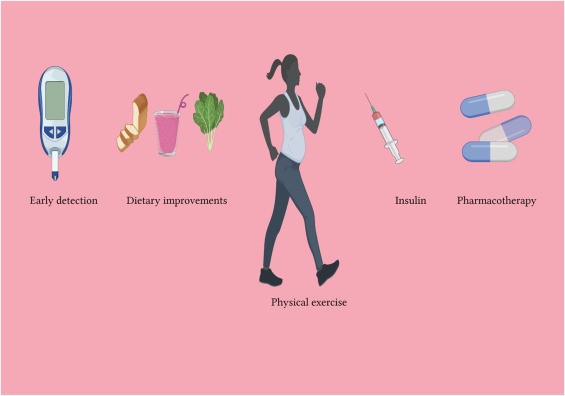
The goal of preconception care is health education, promotion, risk assessment, and intervention before pregnancy to reduce the chances of poor perinatal outcomes. The overall goal is preconception wellness and optimal management of chronic health and behavioural issues.
Unplanned and unintended pregnancy results in late prenatal care which can subsequently contribute to adverse events during pregnancy and poor perinatal outcomes. Both the partners must be assessed for risk factors and educated about the risks associated with poor perinatal outcomes. This risk assessment must include evaluation of overall well-being, medical history, surgical risks, social and behavioural risks, medication risks, occupational risks, education risks, and any other barriers that may pose an undue risk on fertility or pregnancy. A few important items to discuss during preconception counselling include:
Management of Chronic Disease
Any woman with a chronic disease should review her desire to become pregnant with the primary care physician. Pregnancy can increase risks for both the mother and the child Preconception counselling must focus on improving overall well-being prior to becoming pregnant.
Genetic Disorders and Carrier States
Families with histories of genetic disorders should be referred to a genetic counsellor to discuss the risks of transmitting the genetic condition to the newborn.
Folic Acid
Early use of Folic acid prevents neural tube defects. Women of reproductive age should be prescribed folic acid during the preconception period and throughout pregnancy.
Short Interval Pregnancy (less than 18 months)
Short interval pregnancies are associated with preterm deliveries, premature rupture of membranes, maternal morbidity, and mortality, third trimester bleeding, myometritis, and anaemia. Counselling about short interval pregnancy and the negative impact would likely reduce the number of short interval pregnancies
Smoking Cessation
Tobacco use is associated with preterm labour, intrauterine growth retardation, low birth weight, and placental abruption. Smoking cessation should be offered.
Alcohol Use
Alcohol use in pregnancy is associated with foetal alcohol syndrome. Women should be advised to avoid alcohol if they are planning a pregnancy. The use of alcohol during pregnancy can result in neuropsychologic adverse outcomes in the newborn.
Obesity
Obesity is associated with multiple perinatal risks including increased risk for gestational diabetes, hypertension and a higher risk of difficult deliveries, caesarean section, and macrosomic infants. It is advisable to reduce weight according to the BMI before planning pregnancy.
Underweight
Women with malnutrition may be at risk for nutrient deficiencies that increase the risk for low birth weight in the foetus and preterm labour.
Substance Use
Use of drugs in pregnancy is associated with neonatal abstinence syndrome, placental abruption (cocaine), low birth weight, maternal morbidity such as haemorrhage, and foetal and infant mortality. Education must include both perinatal risk and risk to mother and neonate long-term.
Toxin Exposure
Women should be counselled to avoid toxic substances .Toxins with potential impact on reproductive health include lead, arsenic, fluoride, toluene, flame retardants, plastics, and pesticides.
Environmental Exposures
Preconception counselling must include careful evaluation of medications taken by the women prior to pregnancy. Allowing adequate time for the transition to less harmful medicines and optimizing dosing can lead to both improved perinatal outcomes and avoidance of anomalies and poor outcomes for the foetus.
Diabetes Management
Counselling during the preconception period must focus on disease management and education, optimal control, weight management, and education about the potential risks to mother and foetus during the perinatal period.
Infectious Diseases Management
Couples should receive counselling about treatment and potential risks to the mother and baby. Infections with known adverse effects or long-term sequelae in the perinatal period are listed below.
- Hepatitis B - Literature supports vaccinating women who are at high risk for hepatitis B during the preconception period. Women with positive hepatitis B status must be educated about risks to the newborn .
- Human Immunodeficiency Virus (HIV) - Those with known HIV status must be educated about the risk of transmission, educated about the reduction in transmission with proper treatment, and encouraged to adhere to medical management throughout the pregnancy.
- Tetanus - The World Health Organization recommends that all women of childbearing age be protected against tetanus. Women at high risk should be vaccinated prior to pregnancy.
- MMR - Preconception counselling should include a vaccination history that includes measles, mumps, and rubella. It is important to vaccinate before pregnancy if the woman has not been vaccinated. The Centres for Disease Control recommend waiting at least 28 days after receiving a rubella-containing vaccine before pregnancy.
In summary, preconceptional counselling includes :
- Getting at least 400 micrograms of folic acid daily, starting before and continuing through pregnancy
- Getting recommended immunizations
- Eating a healthy diet and maintaining proper weight
- Getting regular physical activity, unless advised otherwise by your doctor
- Avoiding cigarettes, alcohol, and drugs (except for medications approved by your doctor)
- Seeing your doctor regularly
- Working with them to manage problems such as diabetes, depression, high blood pressure, or infection
